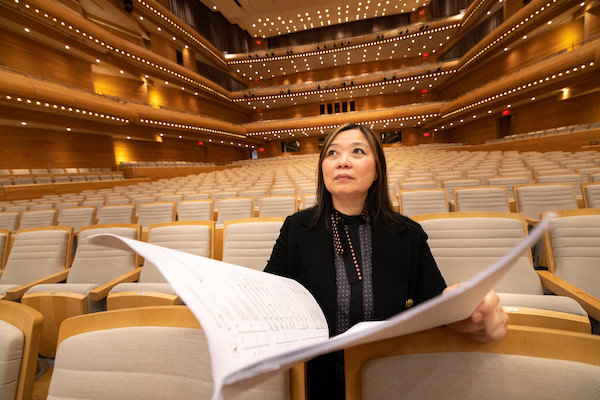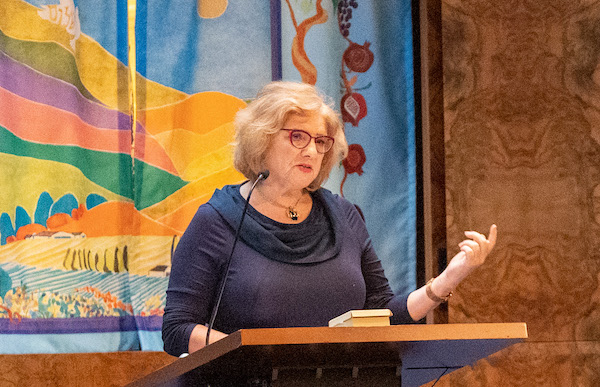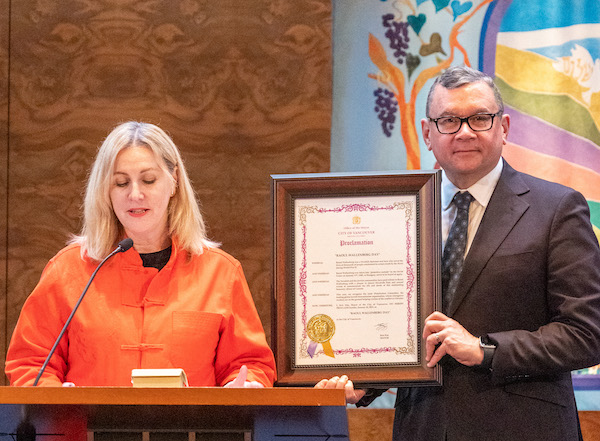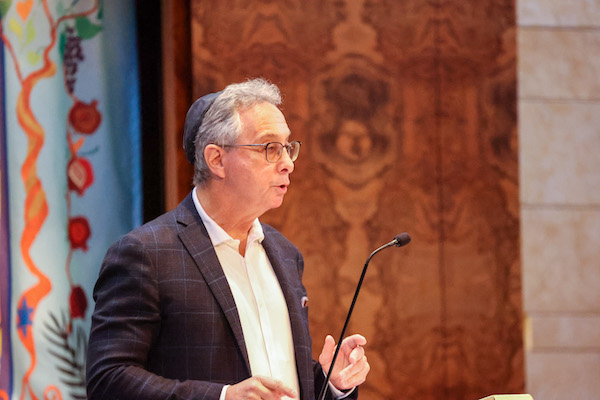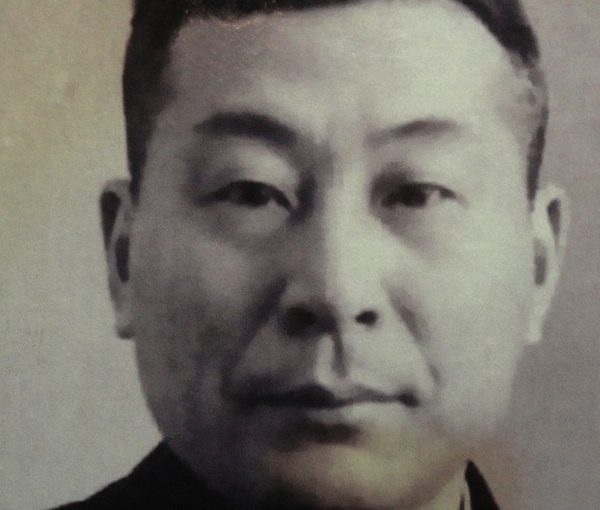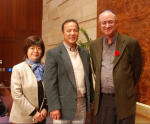Composer Rita Ueda has written an opera inspired by Barbara Bluman’s book I Have My Mother’s Eyes. (photo by Danilo Bobyk)
“In light of what is happening in the news today, we need to tell the story of Chiune Sugihara and the Bluman family more than ever,” composer Rita Ueda told the Independent. “I suspect more and more world leaders, communities and individuals will be faced with the decision to either do the easy thing, or the right thing. We need to tell ourselves more stories of compassion, courage, healing and family love.”
Ueda’s chamber opera I Have My Mother’s Eyes: A Holocaust Memoir Across Generations premières at the Rothstein Theatre Nov. 18-19, as part of the Chutzpah! Festival. Directed by Heather Pawsey, the opera tells the story of Sugihara, the Japanese diplomat who risked his own life during the Holocaust to issue visas to Jews, including members of Vancouver’s Bluman family. Its title comes from the late Barbara Bluman’s book of the same name, which was published in 2009, five years after her death from cancer.
“I don’t think I fully knew why I wanted my mother’s book published … when I immersed myself in this legacy project,” said Danielle Schroeder. “Looking back, bringing her story and my grandmother’s stories to life brought me a lot of comfort and meaning as I grappled with the profound sense of loss her death brought…. Also, at the time it was published, stories about the impact of intergenerational trauma and resilience were not being written about that much in the mainstream, so I felt my mom’s book was unique in the way it interweaves and interconnects her and her mother’s stories of trauma, loss and hope. And, of course, being able to share with the world the story of courage, generosity and compassion of the Sugihara family was also important to me.”
Ueda found out about the Bluman family in 2017, through an installation at the Maritime Museum, and reached out to George Bluman, Barbara’s brother. She was moved by the intergenerational nature of I Have My Mother’s Eyes.
“Zosia [Susan] Bluman’s escape from the Holocaust is only a part of the story,” she said. “The story of how the next two generations carried on the family legacy affected me to the core. When George suggested I expand the opera to include the story of the three generations of the Sugihara family that saved them, I became compelled to create the opera!”
“I was very touched and honoured that such a well-respected Canadian composer would want to write an opera about my mom’s book,” said Schroeder. “Especially after meeting Rita in person and learning … how my mom’s book impacted her, it was easy to say ‘yes.’”
Ueda’s opera is inspired by Barbara Bluman’s book, rather than based on it.
“Opera is best suited to convey the characters’ emotional journey,” Ueda explained. “The opera covers all three characters from the book – Zosia, Barbara and Danielle – the three generations of the Bluman women, and their love for each other in light of all the events in their lives. Materials on the three generations of the Sugihara family were based on my two visits to the Sugihara family in Tokyo. Madoka Sugihara spent over five hours with me on each visit, and she showed me many photos and books. She let me play [her grandfather] Chiune Sugihara’s collection of sheet music on his piano, and she told me many family stories. I was truly moved by the two families’ journey of survival, healing, and love for each other.”
George Bluman shared a bit about the real-life people depicted: Zosia, Barbara and Danielle on the Bluman side and Chiune, Yukiko, Hiroki and Madoka on the Sugihara side.
Bluman’s mother was born in 1920 and died in 2004. “Her story, before coming to Vancouver in July 1941, comes to life in I Have My Mother’s Eyes,” he said. “In Vancouver, she worked as a salesperson/buyer in women’s clothing at Cordell’s and Jermaine’s. She was one of the founders of the annual Warsaw Ghetto memorial program, the forerunner of the current annual Yom Hashoah commemoration. Mum is featured in the 2000 PBS documentary Sugihara Conspiracy of Kindness, as well as in the Holocaust museums in Washington, New York and Los Angeles. She loved her family, hosting raucous weekly Sunday dinners for all, often including her children’s friends.
“My sister, Barbara Bluman (1950-2001), graduated from UBC Law School in 1975, among the first large class of women. She was an independent thinker and feminist who lovingly balanced raising her children and her career in law. Her commitment to human rights was demonstrated in all of her pursuits…. Her deep dedication to Holocaust understanding led to her contribution to the Gesher Project, a second-generation cultural exploration of the Holocaust, and organizing an important symposium on the Nuremberg trials.”
Bluman said that, from 1996 to 2000, his sister made notes from 19 interviews with their mother. “Excerpts from these notes formed the basis for her book,” he said, praising his niece’s efforts in getting the book published.
“Yukiko Sugihara (1913-2008) married Chiune Sugihara (1900-1986) in 1936,” said Bluman. “In 1993, my family first met her, together with her oldest son, Hiroki (1936-2002), and Michi (Hiroki’s wife) for a few hours at the Vancouver airport during a stopover on their way to a dinner in Toronto organized by Ontario Premier Bob Rae involving the Jewish and Japanese communities. There was a spontaneous outpouring of strong emotions. To me, in her demeanour, she was an empress! She knew no English and I no Japanese, but I felt what she was saying. My mum and Barbara attended the dinner in Toronto, where the principal guest speaker was David Suzuki.”
There were a few other encounters, and Bluman said he and his brother Bob have corresponded regularly with Madoka. “I have met her twice in visits to Japan,” said Bluman, noting that Bob joined him on the second visit.
“Madoka is a very gracious person and works passionately on making the world aware of the heroic legacy of her grandparents. According to Madoka, her grandmother Yukiko played a most essential role in the Sugihara story.”
Ueda’s opera is “especially meaningful,” said Schroeder, “because it brings my mother back to life and honours her in such a profound way.”
She added, “I wouldn’t be here if it wasn’t for the Sugihara family, so to see a piece of art be created that brings our family together is moving beyond words.”
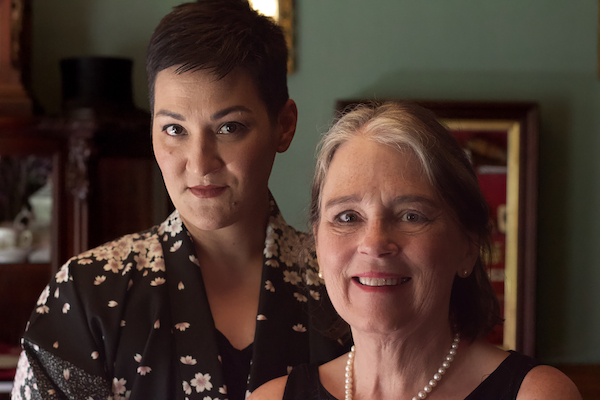
It has taken seven years to get to this point – the opera’s première.
“George and Danielle have been wonderful to work with,” said Ueda. “They have shown me photos (which you will see in the production) and shared family stories with me. They also introduced me to the wonderful Sugihara family.”
Ueda shared “two fun facts”: George Bluman, an emeritus math professor at UBC, trained her brother, a former math professor himself; and she has received permission to turn Yukiko Sugihara’s Midnight Sun Songs, poems that chronicle her story as the wife of Chiune Sugihara, into a sequel to I Have My Mother’s Eyes. The world première will be in Tokyo in October 2024.
Ueda has been composing since she was a toddler. “My late mother was an opera singer, so I grew up in a household with music,” she said. “My early musical ‘scores’ were crayon drawings of picture-representations of the sounds I improvised at the piano. My very first composition teacher when I was 3 (who was about 95 at the time) encouraged me to improvise at the piano and to keep on ‘drawing’ scores in crayon colours, even though his own teachers in the 1880s were Helmholtz and Tchaikovsky. He also arranged for me to see many concerts and events with composers such as Steve Reich, Earle Brown and John Cage.”
The environment, human rights and other societal issues have inspired Ueda’s work. “People in the audience do not need to agree with what I say in my music, but I want them to use the experience as a catalyst for important community dialogue,” she said.
For Ueda, opera is the perfect medium for telling a story with a strong emotional content.
“Opera cannot deliver a blow-by-blow story like a TV drama, film or documentary,” she acknowledged, “but music combined with voice can speak to you at the deepest, most profound level. Through opera, I hope to tell engaging and relevant stories that are important to us – who we are, what we stand for, and what we believe in. European opera has had a history of elitism throughout the past 400 years, but recent Canadian opera productions have been changing this. I hope I Have My Mother’s Eyes will contribute to this change.”
For tickets to see I Have My Mother’s Eyes, visit chutzpahfestival.com.

